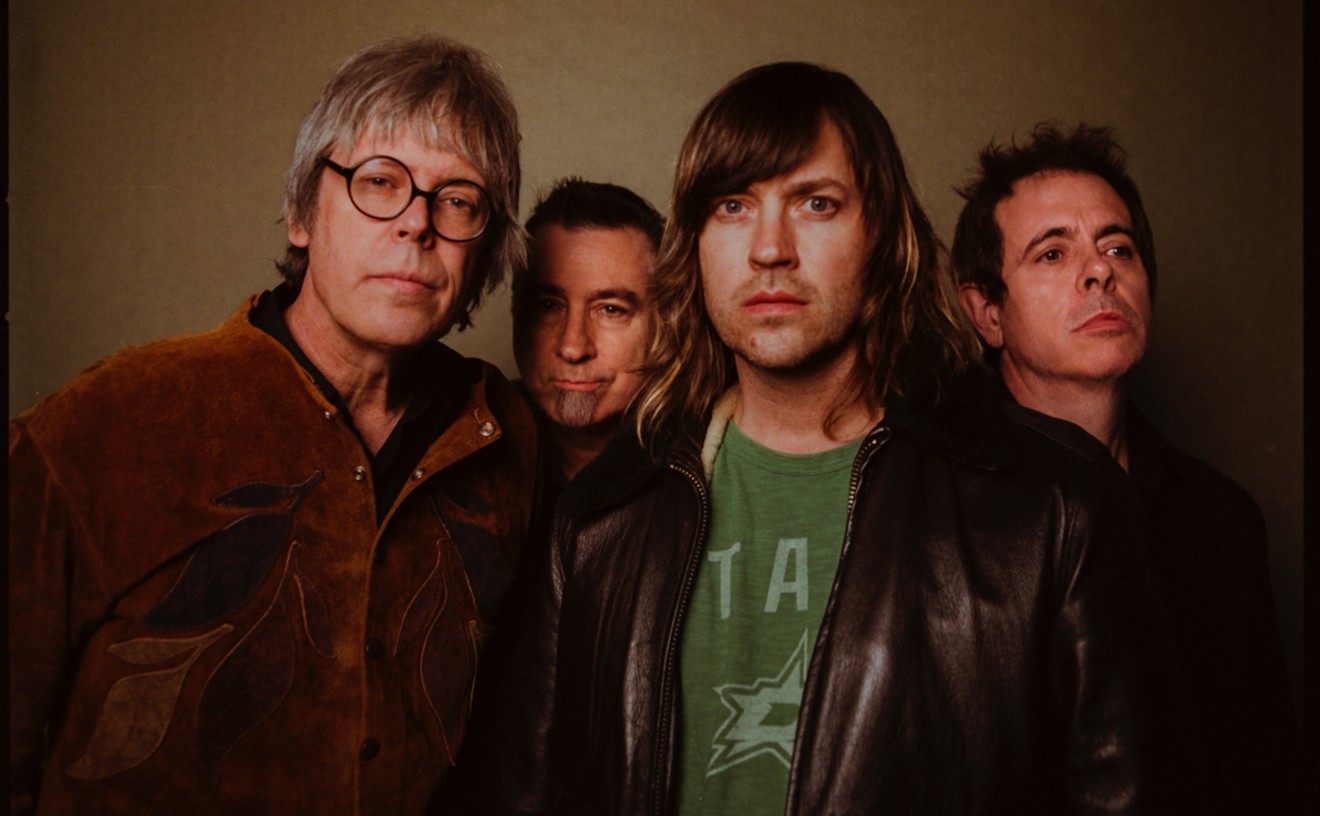Perhaps it doesn't sound like a grand revelation; perhaps it brings to mind the grumblings of a middle-aged rock-and-roller whose time at the top of the pops came and went so long ago there aren't many around who remember the name Joe Jackson...or who care much about it, anyway. But, in reality, it's not at all a gripe; rather, it's just a sobering declaration coming from a very gifted, unfortunately forgotten man who realized late in his career that he would never--could never--again make a hit record.
Joe Jackson--best known for albums released in the late 1970s and early '80s, such records as Look Sharp! and I'm the Man and Night and Day--can no longer make records for the old-timers who pine for the days when he asked, "Is She Really Going Out With Him?" He's given up on the charts and the videos and the screaming fans, and begun writing albums more ambitious than anything he's ever attempted before. For a while, he even considered forming his own label; if nothing else, at least he wouldn't have to answer to anyone when his records tanked.
Yet, in the end, Sony Classical decided to release the brand-new Heaven & Hell, Jackson's schizophrenic, conceptual take on the seven deadly sins that features Suzanne Vega, Brad Roberts, and Jane Siberry--alongside classical violinist Nadja Salerno-Sonnenberg. And if it does not recall his heyday--it's far grander than anything Jackson managed before it, a classical-pop concept album that addresses gluttony and lust--you must at least respect its size. And if you do not like it, if you prefer the punk sneers and pop romances of old, then at least you must admire Jackson for exposing himself in public. For, if nothing else, Joe Jackson literally suffered for his art, withdrawing from performing and writing for years until he came up with a record all about envy and anger.
"I really feel like I'm coming into my own now," says the man who had a few hits way back then. "The older you get, the more music becomes really...shit, how can I put it?...a more spiritual thing or something. It becomes less about trying to impress people, trying to make people love you, you know, less about superficial things and more about...whew, it's hard. It becomes more..." His voice trails off.
"My words are failing me," the 43-year-old Jackson says, not really apologizing. "It's very hard to explain. It becomes less superficial and more..."
For yourself?
"Well, it's for everyone," he corrects. "It's for an audience. It's not just for me. But there's a big difference between writing for an audience and pandering to a theoretical audience thinking you know what they want. There was always the element of, 'What do people want?' and so on, but not anymore."
Jackson recalls that he nearly gave up on music after the tour supporting his 1991 record Laughter and Lust, his first release for Virgin Records after more than a decade spent on A&M--and the album on which he tried to capture yesterday's lightning in a broken bottle. Though hardly an embarrassment, Laughter and Lust sounded very much like a man trying to walk backward in his own footsteps. It recalled Look Sharp!, I'm the Man, and 1980's Beat Crazy, but recalled was all it did; it made you want to go back to the older records, the better records. No point in listening to an echo. When Rolling Stone remarked that it was "a more polished version of some of Jackson's most memorable early work," the compliment was unintentionally damning.
After all, Jackson had spent the better part of the 1980s trying to prove he was far more than a pop songwriter: 1981's Jumpin' Jive was a joyous salute to the jump swing of Cab Calloway and Louis Jordan; Night and Day was a Latin-jazz mood piece; and Body and Soul, with its Sonny Rollins homage on the cover, was all Tin-Pan pop and Broadway soul. There were the intimate sociopolitical statements ('86's Big World, recorded in front of an audience ordered not to applaud); the classical excursions (Will Power in 1987, a record far better than its reputation); the soundtracks for Mike's Murder and Tucker; the essential live best-of; and the grown-up rock-and-roll fantasies of '89's Blaze of Glory.
Through it all, Jackson didn't evolve as much as he bottom-to-top recreated himself every time out. He was a chameleon, latching onto an idea for one record, till something better came along for the next. He didn't write hit singles; he penned elaborate, assiduous symphonies that lasted first for three minutes, then for 30. Yet despite his ambitions, despite his unbounding talent, he still wanted to be all things to all people, and when no one bought his records, he finally paid the price for his desires.
There had been, of course, a time when Jackson could write short, sharp nuggets with the best of them: Look Sharp! and I'm the Man were furious, hilarious records filled with sneering songs about fools in love and other suckers. His voice was nasal and stand-offish; he recited lyrics as though they were threats, and so he was labeled punk by association; you always got the feeling he was making fun of rock and roll from a close distance. He had, after all, attended the Royal Academy of Music on a piano scholarship when he was 16; while there he also studied percussion, composition, and orchestration, and then spent a little time in the National Youth Jazz Orchestra and playing at the local Playboy Club in Portsmouth, England. Quite by accident, he fell into the rock-and-roll thing, playing in pub cover-bands while he worked on his orchestration. He no more intended to be a punk-rock Irving Berlin than...Elvis Costello, who had long dreamed of being England's Frank Sinatra.
"I quite often get portrayed as, you know, 'Joe Jackson thinks he's too good to give us some good three-minute pop songs,'" he says, laughing like someone who doesn't think what he's just said is too funny. "And I'd rather have a good three-minute pop song than a bad symphony, but people are different and have different abilities, and I'm trying to be true to my own abilities and ambitions.
"I think when you're younger, you want to be part of the in-crowd in some sort of way. Even though I always had this reputation as being defiant misfit or something, I think we all want to have an audience, we all want to be accepted and loved, and no one likes to be told that no one's interested anymore or that their record can't get on the radio or these sort of things."
Jackson's lone stateside Top-10 single, "Steppin' Out," came 15 years ago; he broke into the Top 20 in 1983 ("Breaking Us in Two") and '84 ("You Can't Get What You Want (Till You Know What You Want)"), then disappeared from the charts forever, bouncing from genre to genre, from label to label, from here to nowhere. By '87's Will Power, his records were dismissed even before they were released, written off as pretentious exercises instead of meaningful statements. Critics who once adored Jackson, lumping him in with Costello and Graham Parker, turned against him the moment he stopped writing show-tune love songs and started thinking bigger; they labeled him a dilettante, a man whose talent couldn't keep up with his ambition. By the time of '91's Laughter and Lust, the critics were using his records as drink coasters; he couldn't even buy a negative review. As for record buyers, Jackson's albums were shipped straight to the cut-out bins. If nothing else, he thought, Laughter and Lust would sell to the fans who didn't desert him with Will Power.
But it didn't. And it sent Jackson into a funk that lasted for three years, till the release of Night Music in 1994--a record about which one magazine remarked, "The more he tries, the sillier he gets." It was, for better or worse, his first stab at classical-pop, at melding Will Power with Blaze of Glory. Heartbreaking in places, stomach-aching in others, it was one of those records you really can't listen to, but begrudgingly respect all the same--if only because you know the guy was trying, and he had everything to lose.
"At the end of the Laughter and Lust tour, I was just burnt," Jackson recalls. "I just thought, 'Why the hell am I doing this?'
"It was devastating. It was the worst period of my life. Night Music was sort of my recovery record. It was, I don't know what you call it, but that was sort of part of a healing process really, making that record."
But Virgin was still waiting for another Look Sharp!, not Will Power Redux; not long after the release of Night Music, Virgin and Jackson parted ways, and it was another three years before Jackson again released a record.
Heaven & Hell, in the end, is hardly a departure for Jackson--at least no more than The Juliet Letters was for Elvis Costello. It takes the intimate, orchestral pop of Night Music to its logical end--a sweeping, symphonic concept album, though Jackson himself refers to it as "a baby step outside conventional pop." It's one of those records made by a musician who was this close to packing it in till he realized he had nothing to lose, and it's hardly a masterpiece: Where once Jackson could get a laugh without even telling the punchline, now he labors to get the joke out. And the music is often so overwrought, it plays like parody, most notably on the fugues that bookend the record. But there are moments--such as on the Suzanne Vega-Dawn Upshaw duet "Angel," on which two women (one an angel, the other a "fallen angel") fight for a man's soul--where Jackson captures the moment before a laugh turns into a frown; it hints at better things, suggests that Jackson will no longer stumble backward, as he did only a few years ago.
"I think every artist gets to some crisis point somewhere, and it usually happens in your mid- to late-30s or 40-ish or something," he says. "It happens to a lot of artists. I mean, actually, most of the really great artists that you think of went through some kind of crisis or change of direction somewhere in that part of their lives, where they start to do something a bit different or else they give up, burn out, or start to just repeat themselves, and it's never as good as what they did when they were younger. But I'm trying to adapt creatively and go forward.










